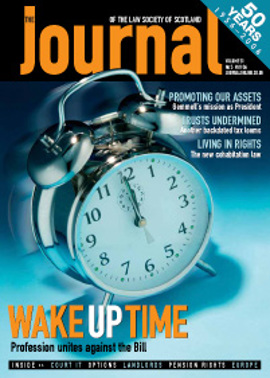The tax man cometh (again)

Practitioners will be aware of the significant changes proposed for the inheritance tax treatment of trusts. These are contained in schedule 20 to the Finance Bill currently before the UK Parliament, but if passed in their current form the changes would be deemed to take effect from 22 March 2006 (Budget day).
Many consider that the changes are penal and to some extent retrospective; at the very least their impact may be severe and governed by legislation which is extremely complex and lacking in clarity. The Law Society of Scotland has played and continues to play a full role in the efforts being made by a large number of professional bodies to persuade the government to remove, restrict or delay the changes. This would enable consultation to take place and would not prejudice clients who have made testamentary or other arrangements on the basis of the current law. It might also enable proper consideration to be given to the large number of situations where any tax saving is simply not an issue in the use of trusts, for instance where protection of vulnerable or incapable beneficiaries is the prime motive.
While these efforts are ongoing and members are urged to add their own weight to them by writing to Members of Parliament or otherwise, this note attempts to summarise the most basic effects of the currently proposed legislation.
Transfers immediately chargeable
1. With very limited exceptions, all lifetime transfers to any form of trust will be treated as immediately chargeable transfers for inheritance tax purposes. Of course, an actual charge (at 20%) will only arise once the nil rate band available to the transferor has been exhausted. This works on a cumulative basis over a seven year period. Because any transferor into trust may have made potentially exempt transfers in that seven year period, in many cases it will not be certain at the time of the transfer into trust whether tax will arise. But the key effect of this change is that transfers into liferent or accumulation and maintenance trusts during lifetime will no longer be potentially exempt. Although other exemptions, such as the annual exemption and that for normal expenditure out of income may continue to be available, it is notable that transfers to a liferent trust for the benefit of one’s spouse will no longer benefit from the spouse exemption. Transfers to a liferent trust for oneself will under the current proposals now be treated as chargeable transfers. However, bare trusts are unaffected by the new rules, the IHT position continuing to be based entirely on the beneficiary’s own position.
2. Property in the vast majority of new trusts – whether created in lifetime or on death will be subject to the special rules which formerly applied only to discretionary trusts. These include a periodic charge of up to 6% on the value of trust property every 10 years and “exit charges” when property leaves a trust. The calculations to arrive at the amount of such charges are complex.
3. Two very limited forms of trust created in death will attract different treatment.
First, “trusts for bereaved minors” will allow parents (not more distant relatives) to create on death a limited form of accumulation and maintenance trust. This would involve a chargeable transfer on death (which was of course the case under the old rules), but once in such a trust, property would not suffer the 10 year periodic charge or exit charges on leaving the trust. However, the conditions to be met in order to qualify for such treatment are extremely restricted. In particular they require outright entitlement to the trust property to pass to beneficiaries at or before the age of 18. (This can be compared to the former accumulation and maintenance regime, which merely required a beneficiary to take an outright or liferent interest by the age of 25.)
Secondly, it would be possible to create an “immediate post-death interest”. The conditions for this are complex to say the least. Essentially in Scotland, it would be a liferent on the termination of which the property would have to go outright to a person (which could be the liferenter) or be held for very limited other purposes. Such a limited form of liferent trust would be treated in the same manner as applied to liferents before the Budget, that is as property to be aggregated with the liferenter’s personal estate.
4. There are some transitional provisions, allowing liferents in existence on Budget day to continue to receive their pre-Budget treatment; and further allowing adjustments to be made to existing liferent and accumulation and maintenance trusts before 6 April 2008, so that such trusts are compliant with the new regime. After this date, many existing trusts will also fall under the new rules, with 10-yearly periodic and exit charges becoming potentially payable.
5. In relation to existing wills it is also probable that deeds of variation or similar arrangements may be of assistance where deaths occur which would otherwise bring adverse tax consequences under the new regime.
6. There are also changes made to the capital gains tax position consequent on the new inheritance tax rules. In particular, the termination of a liferent which is established after Budget day on the death of the liferenter will no longer attract the tax-free uplift to market value on death. However, one of the very few positive consequences of the new rules for taxpayers is that somewhat more transfers to and from trusts may qualify for hold-over relief from capital gains tax.
Still in the dark
As can be seen from this necessarily brief summary, the potential effects of the changes are both wide ranging and complicated. It is necessary to await the final version of the legislation, and probably guidance from HMRC, before assessing the full effect of these changes on solicitors and their clients.
Notably, the effect on the spouse exemption on death where property is put into trust for the surviving spouse rather than passing outright still requires to be clarified. Action may be necessary in some cases to ensure that such a trust qualifies as an “immediate post-death interest”.
The extent to which existing wills will require to be reviewed will depend on the final form of the changes, coupled of course with the forms which existing wills take in individual cases. It is too early, and may not be necessary, to recommend a universal review of all wills held by solicitors. It is however virtually certain that some wills will require to be reviewed in due course. The need for such a review would also depend on the business relationship between clients and the solicitor holding their wills. Particular problems may arise where such a review is desirable, but the client now lacks capacity.
What to do now
In the meantime, it seems immediately necessary to consider the possible effect of the changes outlined above in the following circumstances.
This will be necessary when drawing up new wills where trust arrangements are instructed, especially where the client is relying on the spouse exemption for such trusts and/or has a limited life expectancy such that future changes to the will before death may be difficult. Current styles in use may be flexible enough to cope with the changes in many cases. Unfortunately, it is simply impossible to give comprehensive advice at this time, even though the eventual changes will be retrospective to 22 March 2006.
With regard to clients who have died since 22 March 2006 it is obviously necessary to consider the effect of the changes in terms of wills coming into effect. Again, it is regrettably impossible to give comprehensive advice at this point, but where trusts are created on such deaths, it may very well be that deeds of variation or other post-death alterations may require to be given more consideration than might otherwise have been the case.
It is necessary to be particularly aware of the changes when dealing with any lifetime transfers into (and in limited circumstances out of) trusts since 22 March 2006.
The Tax Law Committee of the Society will continue to work to limit the damaging effects of the changes. If you would like to provide input to these efforts or have any other comments to make at this time, please contact James Ness at the Society (jamesness@lawscot.org.uk), Alan Barr (alan.barr@brodies.co.uk) or Ian Clark (irc@turcanconnell.com). It is fair to say that this represents the most fundamental change to the taxation of trusts and probably to inheritance tax generally for at least 20 years; and that members should be prepared to deal with the impact of these changes as they affect a wide range of clients.
Alan R Barr, Brodies LLP/The University of Edinburgh
In this issue
- Stand up to be counted
- A bill to divide us
- The pendulum swings
- The pendulum swings (1)
- Cohabitation: the new legal landscape
- The tax man cometh (again)
- The foreign legion
- Making IT happen
- Apportioning and sharing
- Property problems
- Still a profession
- Arguing over agreements
- Next generation law
- Lawyers in the transfer market
- Scottish Solicitors' Discipline Tribunal
- Landlords: setting the mark
- Website review
- Book reviews
- Purchase options in leases






